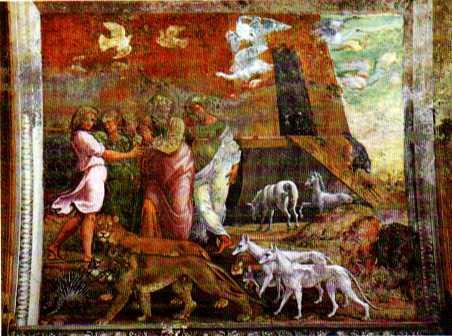
“And Noah builded an altar unto the LORD; and took of every clean beast, and of every clean fowl, and offered burnt offerings on the altar. And the LORD smelled a sweet savour; and the LORD said in his heart, I will not again curse the ground any more for man’s sake; for the imagination of man’s heart is evil from his youth; neither will I again smite any more every thing living, as I have done.” (Genesis 8:20-21)
Noah did two very interesting things when he came out of the Ark:
- He built an altar
- He made offerings to the Lord
“Thus did Noah; according to all that God commanded him, so did he.” (Genesis 6:22)
As we see in Hebrews 11:7, Noah was a man of faith. He carefully obeyed all of the instructions that God gave him and he built the Ark to the exact specifications that the Lord told him. But we see in the first two actions that Noah performed after disembarking from the Ark a subtle difference. These two actions were voluntary, God had not given him instructions to do them.
It is very telling about what kind of a person Noah was that his first priority was to tend to the things of God. After spending a year aboard the Ark, it would seem that the first step would be to set about building shelters to live in and providing for all of the necessities of survival in a new, desolate world. But Noah would not build a place to live in before he built a place to worship God. This time, God gives no blueprint of what His altar should look like, nor does He even encourage Noah to build an altar at all. It is the heart filled with gratitude toward God’s saving grace that is compelled out of pure thanksgiving to honor the Lord of Heaven in such a way. What a contrast between Noah and the world that he had been born into: those who perished in the Flood had failed to acknowledge God at any time or in any way and here we see that Noah put God above all else!
Secondly, Noah made burnt-offerings unto the Lord of one each of the clean animals from the Ark. As one in seven days were a Sabbath dedicated to the Lord, one in seven of these clean animals would be given to the Lord, as well. We are told in verse 21 that Noah’s offerings were a “sweet savour” to the Lord, that is, God accepted his offerings. Like the altar that Noah built, we learn in the Book of Leviticus that a “burnt-offering” is characterized as a voluntary offering, not a required offering (Leviticus 1:3). Although the burnt-offering is voluntary, it speaks of atonement for the one making the offering. In Noah’s actions we see his voluntary recognition of his own sin and his need for atoning sacrifice.
Then we read something rather peculiar in verse 21: “…The Lord said in His heart, I will not again curse the ground any more for man’s sake; for the imagination of man’s heart is evil from his youth; neither will I again smite any more every thing living, as I have done.” It seems that God’s diagnosis of the heart of man did not change after the Flood from what it had been before the Flood (Genesis 6:5). So what had changed? The difference was a recognition of sin on the part of man. We can only speculate, but Noah had likely made offerings unto God even before the Flood. But now, after God has judged the entire world, Noah’s offerings to God take on a whole new meaning.
Noah’s burnt-offerings to God represent how man will ultimately be reconciled to God. These “sweet savour” offerings point to the “Sweet Savour” offering that alone can make full remission of the sins of man possible (Ephesians 5:2). Man is still sinful with a heart filled with evil imaginations, but if we will voluntarily acknowledge our sins to Him and accept the substitutionary sacrifice of the Lord Jesus Christ as payment for those sins, we can receive God’s mercy and grace rather than His judgment.
To Jesus Christ goes all glory. In service to Him,
Loren
[This post was originally published October 30, 2009]
**All Scripture quotations in this post are taken from the King James Version (KJV) Bible
[If you do not know the Lord Jesus Christ or you are not certain where you are headed when this life ends, I invite you to read the article “Am I Going To Heaven?“]
Advertisements